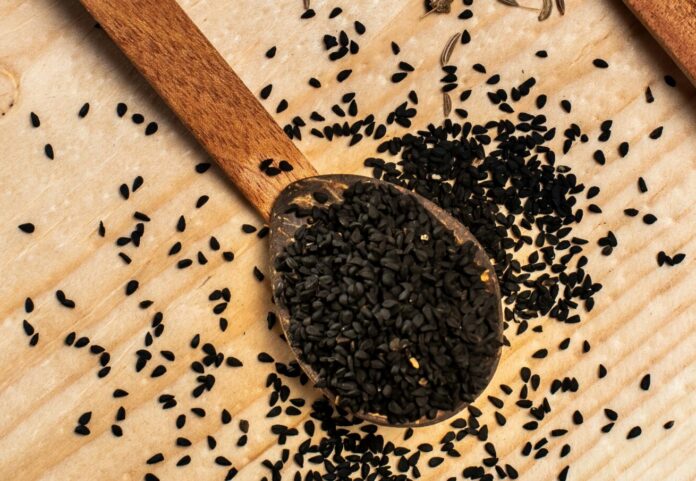In Islam, black seed, also known as ḥabbah sawdāʾ or nigella sativa, holds significant esteem for its health benefits. The use of black seed as a scientifically supported remedy dates back to the era of Prophet Muhammad (peace be upon him), who highlighted its benefits alongside other plant-based foods. Black seed is recognized as a powerful healing property serving as a valuable dietary intervention for disease prevention and promoting overall health.
Black seed has been widely researched for its therapeutic potential and biological properties, demonstrating a broad range of benefits. Studies have shown it possesses antioxidant, anti-cough, gastro-protective, anti-anxiety, anti-ulcer, anti-asthmatic, anti-cancer, anti-inflammatory, and immunomodulating effects. It has also been found to exhibit anti-tumor and hepato-protective properties, aid in treating gastric ulcers, slow tumor growth, enhance memory, stimulate milk production, and display antibacterial activity, among other benefits.
As Muslims, Allah has entrusted our bodies to us as a trust (amana). As Khalifas (stewards or caretakers) of our own selves, it is our duty to care for them with gratitude and responsibility. Incorporating black seed into your health regimen not only promotes well-being but also reflects Islamic values of self-care and a holistic approach to health.
The significance of Black seed is rooted in the following Ahadith:
Black seed as a cure for disease
The Prophet Muhammad (pbuh) said:
… إِنَّ فِي الْحَبَّةِ السَّوْدَاءِ شِفَاءً مِنْ كُلِّ دَاءٍ إِلاَّ السَّامَ…
“There is healing in the black seed for every disease except death.”
(Sahih al-Bukhari, Hadith 5688; Sahih Muslim, Hadith 2215)
Black seed as a remedy
This relates to maintaining balance in one’s life; the full context comes from a narration where the Prophet Muhammad (saw) advised moderation in worship and self-care. This encompasses that Islam’s teachings address both spiritual well-being and physical health. Black seed aligns seamlessly with these holistic teachings through its extensive health benefits.
The Prophet Muhammad (pbuh) said:
…فَإِنَّ لِجَسَدِكَ عَلَيْكَ حَقًّا…
“Indeed, your self has rights over you”
(Sahih al-Bukhari, Hadith 5199)
How Black Seed Supports Digestive Function and Respiratory Health
Black seed’s positive effects on digestion align with Islamic teachings on healthy eating habits. The Prophet Muhammad (pbuh) emphasized mindful consumption, reflecting the Quranic principle of moderation: “A human being fills no worse vessel than his stomach. It is sufficient for a human being to eat a few mouthfuls to keep his spine straight. But if he must (fill it), then one-third of food, one-third for drink and one-third for air.” (Sunan Ibn Majah).
Black seed has been scientifically shown to stimulate digestive enzymes that promote digestion and reduce bloating.
Read More: The Plants Mentioned in the Quran
Islam encourages a holistic approach to well-being, with respiratory health being a crucial element. Black seed’s anti-inflammatory properties, which reduce swelling, and its bronchodilatory effects, which open the bronchial airways to improve breathing, make it especially beneficial for those with respiratory conditions such as asthma.
Versatility
It’s important to understand that its healing properties are not confined to a single method of use. The versatility of its use reflects the Islamic principle of balance and moderation in all aspects of life, including health. The Prophet Muhammad (pbuh) recommended using black seed in various forms, which includes consuming it with honey, a combination that highlights its potential for synergistic healing.
Al-Haafiz Ibn Hajar, a renowned Muslim scholar, said: “What is meant by this seed being a healing for every disease is that it should not be used on its own; rather, it may be used alone or with other ingredients. It may be used ground up or otherwise, and it may be eaten, drunk, used like snuff, applied as a poultice, and in other ways.”
The teachings of Islam guide us to care for our bodies as a trust, and the use of black seed exemplifies this holistic approach. By incorporating natural remedies like black seed, alongside other beneficial ingredients such as honey, we follow the Prophetic example of maintaining health and well-being in a balanced, mindful manner. This not only aligns with the Islamic principles of self-care but also reinforces the wisdom of utilizing nature’s gifts to promote overall health.



